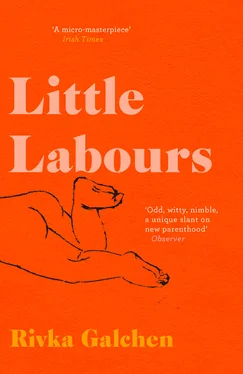not melancholic. Not at all.) But the paradox was that as my life had become a day of unprecedented length, a day that I was calculating to now be almost three thousand hours long (in doing the math I realized that since the puma’s arrival I had not slept more than 2½ hours in a row) my thoughts had become unprecedentedly interrupted, as if every three minutes I had fallen asleep, curtailing any thought, morphing it into dream, which, when I woke, was lost altogether. What I mean to say is that I wasn’t working. This even though my plan had been to work. And to think. Even after the baby was born. I had imagined that I was going to meet, at birth, a very sophisticated form of plant life, a form that I would daily deliver to an offsite greenhouse; I would look forward to getting to know the life-form properly later, when she had moved into a sentient kingdom, maybe around age three. But instead, within hours of being born, the being—perhaps through chemicals the emotional-vision equivalent of smoke machines—appeared to me not like a plant at all, but instead like something much more powerfully moving than just another human being, she had appeared as an animal, a previously undiscovered old-world monkey, but one with whom I could communicate deeply: it was an unsettling, intoxicating, against-nature feeling. A feeling that felt like black magic. We were almost never apart.
I felt suddenly older, even as the puma also, in her effect on me, made me more like a very young human in one particular way, which was that all the banal (or not) objects and experiences around me were reenchanted. The world seemed ludicrously, suspiciously, adverbially sodden with meaning. Which is to say that the puma made me again more like a writer (or at least a certain kind of writer) precisely as she was making me into someone who was, enduringly, not writing.
And I really wanted to see the new forty-seven ronin movie. Even though I had no time for movies. And even though I knew there was an old version of the movie—maybe more than one old version—to which more than one person in my life had been devoted, and I always feel, and felt then, as most people do, some vague obligation to be faithful to the old, and disdainful toward the new, just as a general rule, a general rule to which I’m not deeply (or generally) opposed, even though it is stupid. But any disdain toward the new forty-seven ronin would have been superfluous anyway, since I can now tell you from this distance in time and space, that the movie that I was so ready to find meaningful was out of theaters before I ever got to see it, that it failed unambiguously in the United States and ignominiously in Japan where, despite its budget of $175 million and its popular Japanese cast and its wide release in 693 theaters—I was researching—and even its additional last-minute 3D effects and furthermore despite the fact that the base story was one which its native audience has been interested in hearing told again and again for nearly two centuries now—in Japan, the story of the forty-seven ronin is such a seminal one that there’s even a special term, chushingura , just to describe its tellings—the movie’s box office return in Japan substantially trailed that of its competitors, Lupin the 3rd vs Detective Conan and The Tale of Princess Kaguya: A Princess “Crime and Punishment.”
But the poster had done its unplanned labor. A story of valiance and violence had reseeded itself into my mind and perhaps the minds of countless hungry people who had treated themselves to a slice of dollar pizza, gaze drifted to the new ronin advertised across the street.
What is a ronin? A ronin is an unemployed samurai. Or a samurai without a master. A sword for hire. The term in its time had about it something of menace or disgrace. That is no longer the case. The story of the forty-seven ronin, a few centuries old and based on a historic event and told and retold in plays and movies and honorary temple garden plaques has changed all that. The original forty-seven men (some scholars say maybe there were only forty-six) served a master who was murdered, in court, over a matter of etiquette. The murdered man’s forty-seven (or forty-six) samurai were expected to avenge their master. But months passed, nothing happened. The samurai, now ronin, were said to have returned to domestic lives, or turned to drinking, or to both; it was considered shameful. But because the ronin are leading shamefully ordinary lives, the murderer of their master relaxes his guard; it appears there will be no revenge. But there will be. The ronin covertly gather, storm the compound of their master’s enemy, and present his severed head to the palace. The forty-seven (or forty-six) ronin then commit self-sentenced sepukku—they are murderers now, after all—which is how their own master was coerced into ending his life as well: a symmetry. All of this is understood to be heroic (as opposed to horrifying). Honor reveals itself. In a certain way samurai resembled the wives in those cultures where the widowed are expected to throw themselves on the funeral pyre.
The story of the ronin was especially popular in the Meiji era, when Japan’s isolation policy ended and power shifted from the military back to the emperor; the story was then again even more popular in the years after World War II, or so I’m told. The postwar government coerced the great filmmaker Mizoguchi, who usually made films about women in difficult circumstances, into making a movie of the forty-seven ronin, and the film’s part one failed terribly, but Mizoguchi himself then wanted to make part two and did. What made the story of the forty-seven ronin so popular at those particular moments? What is the story of the forty-seven really about? A story of men who appear to be defeated and shameful, but who have elected that appearance as an essential guise for a noble plan which will become manifest? A story of violence, patience, and outsized fidelity to the master who randomly is yours?
This story is about a baby, I thought of the bloody boyish tale one afternoon, I’m not sure which afternoon, just a bright one, passing the poster with the upside-down woman as I rounded the corner past the deli. Everything was about a baby, then, but still I thought, with conviction: a baby is what the story of the forty-seven ronin is really about . The sleeper cell, the latent power—it’s a parable about babies. They appear helpless, but they are puppetmasters. It makes so much sense. I was obviously wrong, more or less. I had been wanting, at the time of the forty-seven ronin haunting, to think on paper about, not quite coincidentally, two Japanese books: The Pillow Book by Sei Shonagon and The Tale of Genji by Murasaki Shikibu. They were two of my favorite books. It seemed mysterious to me that they both came from the same place and time, from the imperial court of early eleventh-century Japan. Both books were by women which also, I hated to admit, mattered to me. But I wasn’t managing to think about either book. The puma insisted otherwise. But I didn’t want to write about the puma. Mostly because I had never been interested in babies, or in mothers; in fact those subjects had seemed perfectly not interesting; maybe I was even repelled by mothers and babies as subjects to write about; and so, after I had the baby, I found myself in the position (now interested in babies) of those political figures who come to insights others had reached decades ago only after their personal lives intersected with an “issue,” like, say, Dick Cheney, with his daughter, who married a woman. But I still didn’t want to write about babies, albeit now for a different reason. I had originally wanted to write about other things because I was interested in those other things. I then specifically wanted to write about other things because that then might mean I was really, covertly, learning something about the baby, or about babies, or about being near babies, and these were subjects about which, directly, I had so little to say. In the end, without consulting me much, a cabal of neuronal circuits, ronin of their own kind, organized against me and went about coordinating their own thoughts, fueled by dollar pizza, in a minor court on 38th Street.
Читать дальше











